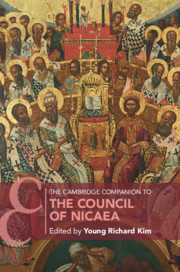Book contents
- The Cambridge Companion to the Council of Nicaea
- Cambridge Companions to Religion
- The Cambridge Companion to the Council of Nicaea
- Copyright page
- Dedication
- Contents
- Figures
- Contributors
- Acknowledgements
- Abbreviations
- 1 Introduction
- Part I Contexts
- Part II The Council
- Part III Outcomes
- Part IV The Aftermath
- 11 The Reception of Nicaea and Homoousios to 360
- 12 The Emergence of the Pro-Nicene Alliance
- 13 Apollinarius and the Nicene Homoousion
- 14 The Council of Ariminum (359) and the Rise of the Neo-Nicenes
- Part V The Long Reception
- Appendices
- Bibliography
- Index
- References
13 - Apollinarius and the Nicene Homoousion
from Part IV - The Aftermath
Published online by Cambridge University Press: 17 December 2020
- The Cambridge Companion to the Council of Nicaea
- Cambridge Companions to Religion
- The Cambridge Companion to the Council of Nicaea
- Copyright page
- Dedication
- Contents
- Figures
- Contributors
- Acknowledgements
- Abbreviations
- 1 Introduction
- Part I Contexts
- Part II The Council
- Part III Outcomes
- Part IV The Aftermath
- 11 The Reception of Nicaea and Homoousios to 360
- 12 The Emergence of the Pro-Nicene Alliance
- 13 Apollinarius and the Nicene Homoousion
- 14 The Council of Ariminum (359) and the Rise of the Neo-Nicenes
- Part V The Long Reception
- Appendices
- Bibliography
- Index
- References
Summary
Episcopal colleagues and later church historians praised Apollinarius of Laodicea for his adherence to the trinitarian orthodoxy articulated at the Council of Nicea and its use of the term homoousion to define the relationship between the divinity of the incarnate Son and that of his Father. However, Apollinarius and his disciples also used this term in Christological discussions concerning the relationship between Christ’s humanity and divinity. This chapter provides a detailed examination of the use of the Nicene term homoousion in the trinititarian and Christological statements of Apollinarius of Laodicea and his disciples. It then considers what prompted Apollinarius to make the move toward applying the Nicene homoousion to Christology, placing that critical moment in the late 350s and early 360s when Apollinarius may have been subject to influences from Athanasius of Alexandria and theologians in the Homoiousian movement. The chapter illuminates the links between trinitarian theology and Christology in the fourth century and what the debates about the Nicene homoousion in the Apollinarian community may have contributed to the Chalcedonian Definition of 451.
Keywords
- Type
- Chapter
- Information
- The Cambridge Companion to the Council of Nicaea , pp. 282 - 304Publisher: Cambridge University PressPrint publication year: 2021

